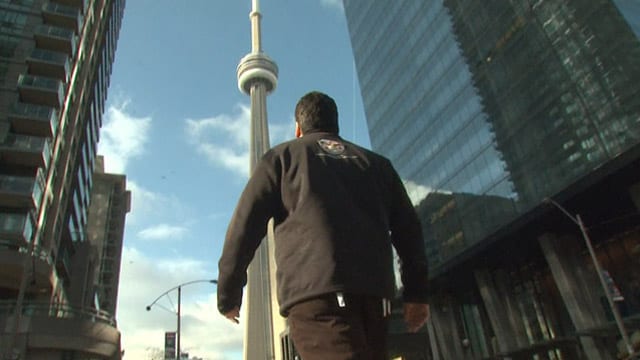
RIPPED OFF
Rob Smith, APTN Investigates
Harry Slade, the chairperson of the Special Claims Tribunal, spoke to APTN Investigates reporter Rob Smith for the story “Ripped Off” that airs February 10 after the APTN National News.
Slade is a judge from British Columbia and was appointed to the Tribunal as a member in 2009 and became chair in 2010. He is the only full-time member. Here is an excerpt of his interview.
RS: At this point, you are the only full-time justice on the Tribunal?
HS: Yes, and I’m in my second term with 4 ½ years to go, and at the moment there is no obvious successor to myself in the chairperson’s position.
RS: What I have been finding is that there has been a steep increase in the rejected claims, which means those have the right or possibility to come to the Tribunal. One of the things you brought up in May is you questioned the wisdom of the Department of Justice not disclosing reasons for rejection. Why was that important?
HS: A specific claim, which is a historical claim related to land or treaty or other so-called Indian assets against the Crown, first goes to the minister of Indigenous Affairs. There’s an office — the Specific Claims Branch — that reviews these claims and recommends acceptance or non-acceptance to the minister.
If the claim is rejected or not accepted by the minister, the claimant can bring it to the Tribunal. If the claim is accepted and in negotiations for a period of time without success, it can then come to the Tribunal. In the Tribunal, it’s a court-like process and the parties are both required to make full disclosure of all information they have that may relate to the subject of the claim.
Now, in any process that involves the resolution of conflicting interests, it’s very important that both sides know what the other has in the way of information that relates to the claim.
In courts, it’s a rule, disclosure has to be made; likewise in the Tribunal. But in the specific claims process, there’s no such rule, such as I understand it, and I’m told by claimants that, in fact, the material in the possession of the Crown is not disclosed to them. So, it’s not hard to see that the process itself is somewhat unfair.
The review of claims for acceptance would have greater integrity if disclosure was made by both parties. And, if a claim is accepted for negotiation in that process, it’s critically important that both sides know what the other has in its kit.
RS: Have you ever been given a satisfactory reason as to why the Crown doesn’t disclose?
HS: No, far from it. We found…that when the matter comes to the Tribunal the Crown is reluctant to disclose even that that was on the table — in the process review of claims for acceptance or non-acceptance, and in negotiations. Which to my mind, being a lawyer for quite a while and being a judge for quite a while, seems most unusual.
The greatest degrees of candour and openness should be there on both sides. Because it’s not just a legal matter — it’s a matter of importance to society at large and it’s really a part of reconciliation. So I am not comfortable with rules that impair the production of information.
RS: It’s a very personal thing for First Nations that are bringing these claims. I spoke with Chief Anne Lou from Williams Lake and … she is taking it very personally and is very hurt, and considered a resolution to specific claims, to be so important to her on a personal level.
You’ve mentioned that it is now awaiting a possible Supreme Court hearing. But for First Nations who saw the Tribunal as (the) final decision and now have to go back to the Supreme Court, it’s a bit eye-rolling that they have to go through that avenue now. Why do you believe that in some cases the Supreme Court is the answer?
HS: The decision of the Supreme Court of Canada is final – there’s no appeal after that. Once that’s done, you know what the law is. It binds all the courts below it. By and large, I think the process achieved its aims, though there were concerns about the lack of openness, as I’ve expressed.
RS: What about First Nations who say as the Tribunal needs more and more resources, it takes money away from the research it takes to get claims to the Tribunal stage?
HS: I will say that the cost of proceedings before the Tribunal has proven to be greater than anticipated and most of the costs are fees paid to legal counsel. My hope was and continues to be that as we have a body of law established, the cost of bringing these matters to Tribunal will be reduced. If disclosure were easier to obtain the cost would be reduced considerably.











